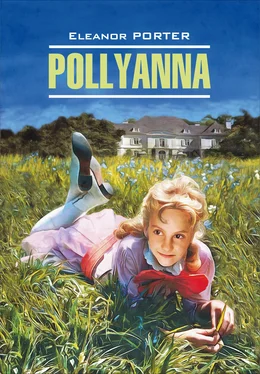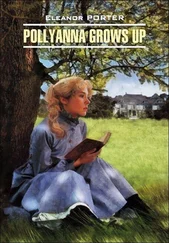“Very poorly, thank you,” murmured Mrs. Snow, falling back into her usual listless attitude. “I lost my nap this morning. Nellie Higgins next door has begun music lessons, and her practising drives me nearly wild [73] drives me nearly wild – ( разг. ) просто сводит меня с ума
. She was at it all the morning – every minute! I’m sure, I don’t know what I shall do!”
Polly nodded sympathetically.
“I know. It IS awful! Mrs. White had it once – one of my Ladies’ Aiders, you know. She had rheumatic fever, too, at the same time, so she couldn’t thrash ’round. She said ’twould have been easier if she could have. Can you?”
“Can I – what?”
“Thrash ’round – move, you know, so as to change your position when the music gets too hard to stand.”
Mrs. Snow stared a little.
“Why, of course I can move – anywhere – in bed,” she rejoined a little irritably.
“Well, you can be glad of that, then, anyhow, can’t you?” nodded Pollyanna. “Mrs. White couldn’t. You can’t thrash when you have rheumatic fever – though you want to something awful, Mrs. White says. She told me afterwards she reckoned she’d have gone raving crazy if it hadn’t been for Mr. White’s sister’s ears – being deaf, so.”
“Sister’s – EARS! What do you mean?”
Pollyanna laughed.
“Well, I reckon I didn’t tell it all, and I forgot you didn’t know Mrs. White. You see, Miss White was deaf – awfully deaf; and she came to visit ’em and to help take care of Mrs. White and the house. Well, they had such an awful time making her understand ANYTHING, that after that, every time the piano commenced to play across the street, Mrs. White felt so glad she COULD hear it, that she didn’t mind so much that she DID hear it, ’cause she couldn’t help thinking how awful ’twould be if she was deaf and couldn’t hear anything, like her husband’s sister. You see, she was playing the game, too. I’d told her about it.”
“The – game?”
Pollyanna clapped her hands.
“There! I ’most forgot; but I’ve thought it up, Mrs. Snow – what you can be glad about.”
“GLAD about! What do you mean?”
“Why, I told you I would. Don’t you remember? You asked me to tell you something to be glad about – glad, you know, even though you did have to lie here abed all day.”
“Oh!” scoffed the woman. “THAT? Yes, I remember that; but I didn’t suppose you were in earnest any more than I was.”
“Oh, yes, I was,” nodded Pollyanna, triumphantly; “and I found it, too. But ’tWAS hard. It’s all the more fun, though, always, when ’tis hard. And I will own up, honest to true [74] honest to true – ( искаж. ) честное слово
, that I couldn’t think of anything for a while. Then I got it.”
“Did you, really? Well, what is it?” Mrs. Snow’s voice was sarcastically polite.
Pollyanna drew a long breath.
“I thought – how glad you could be – that other folks weren’t like you – all sick in bed like this, you know,” she announced impressively. Mrs. Snow stared. Her eyes were angry.
“Well, really!” she ejaculated then, in not quite an agreeable tone of voice.
“And now I’ll tell you the game,” proposed Pollyanna, blithely confident. “It’ll be just lovely for you to play – it’ll be so hard. And there’s so much more fun when it is hard! You see, it’s like this.” And she began to tell of the missionary barrel, the crutches, and the doll that did not come.
The story was just finished when Milly appeared at the door.
“Your aunt is wanting you, Miss Pollyanna,” she said with dreary listlessness. “She telephoned down to the Harlows’ across the way. She says you’re to hurry – that you’ve got some practising to make up before dark.”
Pollyanna rose reluctantly.
“All right,” she sighed. “I’ll hurry.” Suddenly she laughed. “I suppose I ought to be glad I’ve got legs to hurry with, hadn’t I, Mrs. Snow?”
There was no answer. Mrs. Snow’s eyes were closed. But Milly, whose eyes were wide open with surprise, saw that there were tears on the wasted cheeks.
“Good-by,” flung Pollyanna over her shoulder, as she reached the door. “I’m awfully sorry about the hair – I wanted to do it. But maybe I can next time!”
One by one the July days passed. To Pollyanna, they were happy days, indeed. She often told her aunt, joyously, how very happy they were. Whereupon her aunt would usually reply, wearily:
“Very well, Pollyanna. I am gratified, of course, that they are happy; but I trust that they are profitable, as well – otherwise I should have failed signally in my duty.”
Generally Pollyanna would answer this with a hug and a kiss – a proceeding that was still always most disconcerting to Miss Polly; but one day she spoke. It was during the sewing hour.
“Do you mean that it wouldn’t be enough then, Aunt Polly, that they should be just happy days?” she asked wistfully.
“That is what I mean, Pollyanna.”
“They must be pro-fi-ta-ble as well?”
“Certainly.”
“What is being pro-fi-ta-ble?”
“Why, it – it’s just being profitable – having profit, something to show for it, Pollyanna. What an extraordinary child you are!”
“Then just being glad isn’t pro-fi-ta-ble?” questioned Pollyanna, a little anxiously.
“Certainly not.”
“O dear! Then you wouldn’t like it, of course. I’m afraid, now, you won’t ever play the game, Aunt Polly.”
“Game? What game?”
“Why, that father – ” Pollyanna clapped her hand to her lips. “N-nothing,” she stammered. Miss Polly frowned.
“That will do for this morning, Pollyanna,” she said tersely. And the sewing lesson was over.
It was that afternoon that Pollyanna, coming down from her attic room, met her aunt on the stairway.
“Why, Aunt Polly, how perfectly lovely!” she cried. “You were coming up to see me! Come right in. I love company,” she finished, scampering up the stairs and throwing her door wide open.
Now Miss Polly had not been intending to call [75] had not been intending to call – ( разг. ) вовсе не собиралась заглядывать
on her niece. She had been planning to look for a certain white wool shawl in the cedar chest near the east window. But to her unbounded surprise now, she found herself, not in the main attic before the cedar chest, but in Pollyanna’s little room sitting in one of the straight-backed chairs – so many, many times since Pollyanna came, Miss Polly had found herself like this, doing some utterly unexpected, surprising thing, quite unlike the thing she had set out to do!
“I love company,” said Pollyanna, again, flitting about as if she were dispensing the hospitality of a palace; “specially since I’ve had this room, all mine, you know. Oh, of course, I had a room, always, but ’twas a hired room, and hired rooms aren’t half as nice as owned ones, are they? And of course I do own this one, don’t I?”
“Why, y-yes, Pollyanna,” murmured Miss Polly, vaguely wondering why she did not get up at once and go to look for that shawl.
“And of course NOW I just love this room, even if it hasn’t got the carpets and curtains and pictures that I’d been want – ” With a painful blush Pollyanna stopped short. She was plunging into an entirely different sentence when her aunt interrupted her sharply.
“What’s that, Pollyanna?”
“N-nothing, Aunt Polly, truly. I didn’t mean to say it.”
“Probably not,” returned Miss Polly, coldly; “but you did say it, so suppose we have the rest of it.”
“But it wasn’t anything only that I’d been kind of planning on pretty carpets and lace curtains and things, you know. But, of course – ”
Читать дальше
Конец ознакомительного отрывка
Купить книгу












